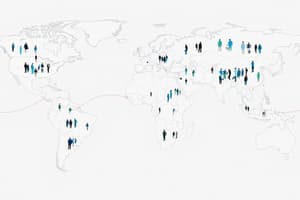Podcast
Questions and Answers
Which group represents individuals who are often long-term unemployed or homeless?
Which group represents individuals who are often long-term unemployed or homeless?
- Underclass (correct)
- Blue-collar workers
- Upper class
- Middle class
What term describes the unequal treatment of people based on their group membership?
What term describes the unequal treatment of people based on their group membership?
- Discrimination (correct)
- Prejudice
- Segregation
- Social stratification
Modernization Theory suggests that nations achieve affluence primarily through which factor?
Modernization Theory suggests that nations achieve affluence primarily through which factor?
- Population control
- Natural resources
- Technological advancement (correct)
- Foreign investments
What does Dependency Theory identify as a reason why poor nations struggle economically?
What does Dependency Theory identify as a reason why poor nations struggle economically?
Which social class category is often contested and falls between the lower and upper classes?
Which social class category is often contested and falls between the lower and upper classes?
Prejudice can be defined as which type of phenomenon?
Prejudice can be defined as which type of phenomenon?
Which theory argues that the colonial process enriched some nations while impoverishing others?
Which theory argues that the colonial process enriched some nations while impoverishing others?
What is the end result of social stratification as described in the content?
What is the end result of social stratification as described in the content?
Which of the following best describes the impacts of stratification in the health sector?
Which of the following best describes the impacts of stratification in the health sector?
The caste system is maintained primarily through which practice?
The caste system is maintained primarily through which practice?
What characterizes the class system of stratification?
What characterizes the class system of stratification?
Which is NOT a consequence of social stratification?
Which is NOT a consequence of social stratification?
In which system are individuals owned by others as their property?
In which system are individuals owned by others as their property?
Which of the following describes the estate system?
Which of the following describes the estate system?
How does stratification impact individual actions?
How does stratification impact individual actions?
What is a significant characteristic of the upper class in the common three-stratum model?
What is a significant characteristic of the upper class in the common three-stratum model?
What does global stratification primarily compare among countries?
What does global stratification primarily compare among countries?
Which of the following definitions best describes social stratification?
Which of the following definitions best describes social stratification?
According to Gisbert, what is a key aspect of social stratification?
According to Gisbert, what is a key aspect of social stratification?
Which of the following is NOT one of the five basic causes of social stratification?
Which of the following is NOT one of the five basic causes of social stratification?
What is a characteristic of social stratification?
What is a characteristic of social stratification?
Which society is NOT commonly associated with the origins of social stratification?
Which society is NOT commonly associated with the origins of social stratification?
Which of the following statements about a stratified society is true?
Which of the following statements about a stratified society is true?
Who emphasized the inequalities of social, political, and economic structures during their time?
Who emphasized the inequalities of social, political, and economic structures during their time?
Flashcards
Global Stratification
Global Stratification
The study of how wealth, economic stability, status, and power are distributed among countries. It highlights inequalities within and across nations.
Social Stratification
Social Stratification
The division of society into layers or strata based on social factors like wealth, power, and prestige. This creates a hierarchy of social positions.
Origin of Social Stratification
Origin of Social Stratification
Social stratification evolved from early hunting-gathering societies to more complex ones. Key drivers include division of labor, job specialization, and the development of industrialization.
Causes of Social Stratification
Causes of Social Stratification
Signup and view all the flashcards
Characteristics of Social Stratification
Characteristics of Social Stratification
Signup and view all the flashcards
Social Stratification - Raymond Murray's Definition
Social Stratification - Raymond Murray's Definition
Signup and view all the flashcards
Social Stratification - Gisbert's Definition
Social Stratification - Gisbert's Definition
Signup and view all the flashcards
Social Stratification: A Stratified Society
Social Stratification: A Stratified Society
Signup and view all the flashcards
What are the two main social classes in ancient Rome?
What are the two main social classes in ancient Rome?
Signup and view all the flashcards
How does social stratification impact the health sector?
How does social stratification impact the health sector?
Signup and view all the flashcards
What are some ways social stratification affects education?
What are some ways social stratification affects education?
Signup and view all the flashcards
How does social stratification limit individual actions?
How does social stratification limit individual actions?
Signup and view all the flashcards
How does social stratification influence societal laws?
How does social stratification influence societal laws?
Signup and view all the flashcards
What is the Slavery System?
What is the Slavery System?
Signup and view all the flashcards
What is the Estate System?
What is the Estate System?
Signup and view all the flashcards
What is the Caste System?
What is the Caste System?
Signup and view all the flashcards
Middle Class
Middle Class
Signup and view all the flashcards
Lower or Working Class
Lower or Working Class
Signup and view all the flashcards
Discrimination
Discrimination
Signup and view all the flashcards
Modernization Theory
Modernization Theory
Signup and view all the flashcards
Dependency Theory
Dependency Theory
Signup and view all the flashcards
Narrow Export Economies (Dependency Theory)
Narrow Export Economies (Dependency Theory)
Signup and view all the flashcards
Lack of Industrial Capacity (Dependency Theory)
Lack of Industrial Capacity (Dependency Theory)
Signup and view all the flashcards
Signup and view all the flashcards
Study Notes
Global Stratification
- Global stratification compares wealth, economic stability, status, and power across countries, highlighting worldwide social inequalities within nations.
- Sociologists studying this analyze economic comparisons between countries.
- Key factors used to calculate global stratification include income, purchasing power, and investment/ownership-based wealth.
Social Stratification
- Social stratification is a social science term describing the relative social position of people in a group, category, geographic region, or social unit.
- The term derives from the Latin word "stratum" (plural "strata"), meaning parallel horizontal layers, representing society's categorization of people into socioeconomic tiers.
- Raymond W. Murray describes it as the horizontal division of society into ‘higher’ and ‘lower’ social units.
- Gisbert defines social stratification as the division of society into permanent groups or categories connected by a relationship of superiority.
- A stratified society is characterized by inequality and differences in how people view each other's positions as "lower" or "higher."
Origin of Social Stratification
- Social stratification emerges from different societal structures:
- Hunting and Gathering Societies
- Horticultural, Pastoral, and Agricultural Societies
- Division of labor and job specialization emerges
- Industrialized Societies
- Improvement of working conditions
Causes of Social Stratification
- Inequality
- Conflict
- Power
- Wealth
- Instability
Characteristics of Social Stratification
- Social stratification is universal and a social phenomenon.
- It’s an ancient concept.
- It takes diverse forms.
- It exists across various forms, such as:
Historical Context
- During the periods of Plato and Kautilya, societal, political, and economic inequalities were prominent.
- Ancient Romans were divided into Patricians and Plebeians.
Impacts of Stratification
- Stratification influences various aspects of life:
- Health Sector (expensive facilities, VIP culture, unequal treatment, unequal distribution of resources)
- Education (diverse systems, teaching methods, outdated syllabus, language conflicts, leading to job discrimination)
- Individual Actions (limited opportunities, stereotyping, labialization, unwillingness to pursue opportunities)
- Societal Laws (punishment amplification, traffic rules, bank policies, discrimination in journalism)
Forms of Stratification
- Slavery System: Extreme inequality, individuals owned as property, lack of political rights, and social disdain.
- Estate System: Stratification existing in Europe during the Middle Ages, with divisions like clergy, nobility, and commoners based on birth.
- Caste System: Social position determined by birth, maintained by endogamous marriages.
- Class System: Industrial society’s stratification based on achieved and ascribed statuses (education, property, business/work).
The Common Three Stratum Model
- Upper Class: Wealthy, well-born individuals holding significant political power.
- Middle Class: The most contested stratum, encompassing individuals in contemporary society positioned between lower and lower classes socioeconomically.
- Lower/Working Class: Wage- or hourly-earning workers, and sometimes an underclass of the long-term unemployed or homeless, often receiving welfare.
Discrimination
- It is the unequal treatment of people based on their group membership, causing and perpetuating societal stratification.
- Prejudice is an attitude. Discrimination is a behavior; the two can occur together or separately.
Global Stratification Theories
- Modernization Theory: A model explaining global inequality through technological and cultural differences.
- Nations gain wealth through technology
- Developed nations aid underdeveloped ones in controlling population, improving food production, and furthering industrialization
- Dependency Theory: Model explaining global inequality through historical exploitation of poor nations by rich ones.
- Colonialism influenced the economic differences between nations
- Economic inequalities are complex problems, not easily solved with foreign aid alone
Conclusion
- Social stratification categorizes people based on economic, political, and social statuses.
- The outcome of this categorization is usually merit-based, creating a type of societal organization.
Studying That Suits You
Use AI to generate personalized quizzes and flashcards to suit your learning preferences.




